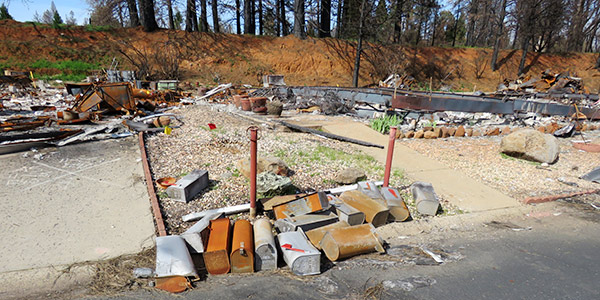By Hudson Sangree
The judge in the Pacific Gas and Electric bankruptcy case on Tuesday prohibited the utility from paying its criminal fines from a trust fund meant to compensate fire victims. Instead, the company agreed during a hearing that it would pay its fines from interest on a separate escrow account.
The company agreed to plead guilty last month to 84 counts of involuntary manslaughter and one count of unlawfully starting a fire, with special circumstances including causing great bodily injury to a firefighter over the November 2018 Camp Fire. PG&E’s deal with the Butte County District Attorney calls for it to pay $3.5 million in fines and $500,000 to the prosecutor’s office to cover the costs of its investigation. (See PG&E to Plead Guilty to Killing 84 in Camp Fire.)
News that the utility planned to tap the victims fund for the fines caused an uproar among fire victims.
PG&E argued that it was required by the terms of its Chapter 11 restructuring agreements to pay the fines and fees from a $13.5 billion trust it plans to establish for more than 70,000 victims of blazes its equipment started in 2015, 2017 and 2018.
Paying the fines directly, in violation of the agreements, could allow the banks providing billions of dollars in backstop financing to back out of the deal, PG&E lead attorney Stephen Karotkin said during Tuesday’s hearing, which was held via conference call because of the coronavirus pandemic. He argued the company had been unfairly criticized for wanting to pay the fines from the victims’ trust.
“There was no sinister motive,” Karotkin said.
U.S. Bankruptcy Judge Dennis Montali said he couldn’t accept PG&E’s payment plan. Lawyers in the case had been masterful at preserving their clients’ legal rights, he said, “and my right here is to not tell the fire victims, ‘You’re going to pay $4 million to a company that has confessed and killed under the criminal laws.’”
The judge issued a tentative ruling Friday expressing similar sentiments.
“Some things not only have to be right, but they have to look right,” Montali wrote. “Telling fire victims that their money will be used to pay criminal fines and penalties does not look right even if digging through the [restructuring agreement] or the [reorganization] plan would lead to that literal result. Nor does saying to people who lost their homes and their loved ones that $4 million is ‘de minimis.’ This not only looks wrong, it is wrong.”
PG&E’s lawyers agreed that if the judge ordered it, the utility would pay its fines from interest accrued on an $11 billion escrow account it intends to establish for another group of claimants, insurance companies and hedge funds that hold third-party subrogation rights based on the prior payment of insurance claims.
Once the escrow account is funded, it will take about two weeks to accrue $4 million in interest, Karotkin told the judge.
PG&E, one of the nation’s largest utilities, filed for bankruptcy in January 2019 after two years of devastating wildfires. It’s hoping to emerge from bankruptcy by June 30 to avoid a threatened state takeover and to participate in a wildfire insurance fund established under state law.
The company has sent out approximately 250,000 ballots and disclosure statements to fire victims, creditors and others entitled to vote on its bankruptcy reorganization plan. The ballots are due by May 15.
The company has acknowledged its equipment ignited the Camp Fire, killing 84 residents and destroying 18,804 structures in and around Paradise, Calif. An 85th resident who died in the fire was deemed a suicide and not included in the charges.




